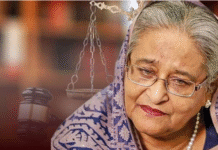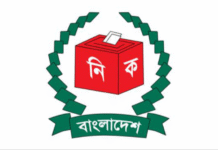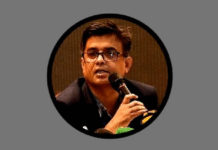
In 2017, the Chattogram Development Authority undertook an ambitious project to solve the perennial waterlogging problem in the country’s commercial capital in just three years.
But the Tk 5,617-crore mega scheme to improve the port city’s drainage system has been stumbling in almost every step of the way, thanks to a hastily done feasibility study and poor action plan.
The three-year project has now been extended by three more years in two phases. In the meantime, the estimated cost of some of the project’s components shot up by 8 to 38 times, according to sources and documents seen by The Daily Star.
So far, only about half of the work — mainly involving expansion and re-excavation of canals — has been completed, with about 29 percent of the total budget spent.
Although the coronavirus-induced economic slowdown is partly to blame for the slow progress, a government-commissioned study attributed the delay “mainly to the flawed feasibility study, slow pace in fund disbursement, a dearth of workforce, and a lack of coordination between implementing and consulting firms”.
Participatory Action Research of Human for Advancement conducted the one-month study (March-April 2021) for the Implementation Monitoring and Evaluation Division (IMED) of the planning ministry.
The project, now set to end in June 2023, is being implemented by the 34 Engineering Construction Brigade of Bangladesh Army.
FAULTY STUDY, POOR PLANNING
Before rolling out the project, the CDA took little time, only about a week, to carry out the feasibility study. It also ignored practical issues such as land acquisition and detailed project design, sources said.
According to town planners and engineers, a sound feasibility study for a project of this scale should take at least a year.
“Even that would be highly ambitious,” one engineer said.
The CDA carried out a “full” feasibility study only after the project began. While the second feasibility study solved some old problems, some new issues popped up requiring major adjustments, project sources said.
The report said the CDA’s planning was so poor that the cost of at least 10 out of 21 purchase packages went up by 116 percent to a mind boggling 3,740 percent compared to the estimated budget.
In some cases, the actual cost was much higher than the estimate because the Development Project Proposal (DPP) lacked a “practical work plan” for different project components.
For example, the estimated cost in DPP for cleaning and maintenance of canals and drains in the eastern part of the city was Tk 7.5 crore. But it took Tk 288 crore to complete the work, which is 3,740 percent (38 times) higher than the estimate.
Citing another example, the report said the cost of constructing an 11km new canal stood eight times higher than the estimate.
Also, in its original budget, the CDA allocated Tk 8.92 crore for procuring 12 excavators. So far, it bought just four for Tk 7.77 crore.
The original feasibility study also underestimated, by a huge margin, the number of settlements that needed to be removed from the project site, slowing down the progress further, sources said.
As of March this year, the CDA has been able to acquire less than 5 percent of the land, or just about 300 kathas against the requirement of 6,517 kathas.
The project will see a cost escalation if its duration is extended further without resolving the existing problems, the report warned.
The report also faulted the CDA for not carrying out the annual audits of the project expenses, which is mandatory for fund release for the project work.
“The CDA has failed to provide important documents including those on purchase, vouchers and meeting minutes,” the report said.
WATERLOGGING: NO END IN SIGHT
“This is a sheer waste of public money and time,” architect and town planner Zarina Hossain said of the poorly planned project.
“The project rolled out without a realistic plan. This is why it is heading in the wrong direction,” she told The Daily Star.
She noted that in 1995, the CDA developed a 20-year master plan, which was realistic. But all the projects that have been taken up since to address the waterlogging problem bypassed this master plan. As a result, the city dwellers could not reap the benefit of the projects worth thousands of crores of public money.
Pointing out the methodological flaws in the work, city planner and engineer Subhash Barua said infrastructural works have started before renovation of the canals.
“As a result, waterlogging has increased rather than decreased after half of the project work,” he said.
The slow progress means the city dwellers will continue to suffer during monsoons when residential areas, key thoroughfares and the biggest wholesale commodity market at Khatunganj go under knee- to waist-deep water.
Late last month, Saleh Ahmed, 55, fell into an open sewer while wading waist-deep in Muradnagar area, never to be found again. A CNG-run auto-rickshaw fell into a ditch in Sholashahar during rain two months before that, killing two people.
Earlier in 2019, a retired government official died after being swept away in an open drain near Shilpakala Academy.
The economic impact of the port city’s waterlogging problem is also huge.
A recent study commissioned by Chittagong Chambers of Commerce and Industries found that Khatunganj traders incurred a loss of over Tk 514 crore due to waterlogging in 2020.
CASH OR COORDINATION?
Project Director of CDA Ahmed Moinuddin would not make any comment.
However, during the government-commissioned study, the CDA acknowledged ignoring many crucial issues to do the initial feasibility within a short time.
It blamed slow fund disbursement by the housing and public works ministry for the slow progress. It also claimed that it could not complete the audit in time, as they did not get the updated information for a lack of coordination between the army, the city corporation and the Water Development Board, the report said.
Lt Col Md Shah Ali, project director of 34 Engineering Construction Brigade of Bangladesh Army, blamed fund shortages for the slow progress.
“We are not getting the amount of money that should be allocated for the speedy implementation of the project. About Tk 1,500-1,600 crore is needed to complete the work we plan to do by this year, but the ministry has released only Tk 350 crore. You need at least Tk 600-700 crore for the land acquisition alone,” he told The Daily Star recently.
Pradip Ranjan Chakraborty, secretary of IMED of the planning ministry, insisted that funds were not the “main” problem.
“The biggest challenges are the lack of coordination between the agencies and the wrong Development Project Proposal,” he said.


 For all latest news, follow The Daily Star’s Google News channel.
For all latest news, follow The Daily Star’s Google News channel.







